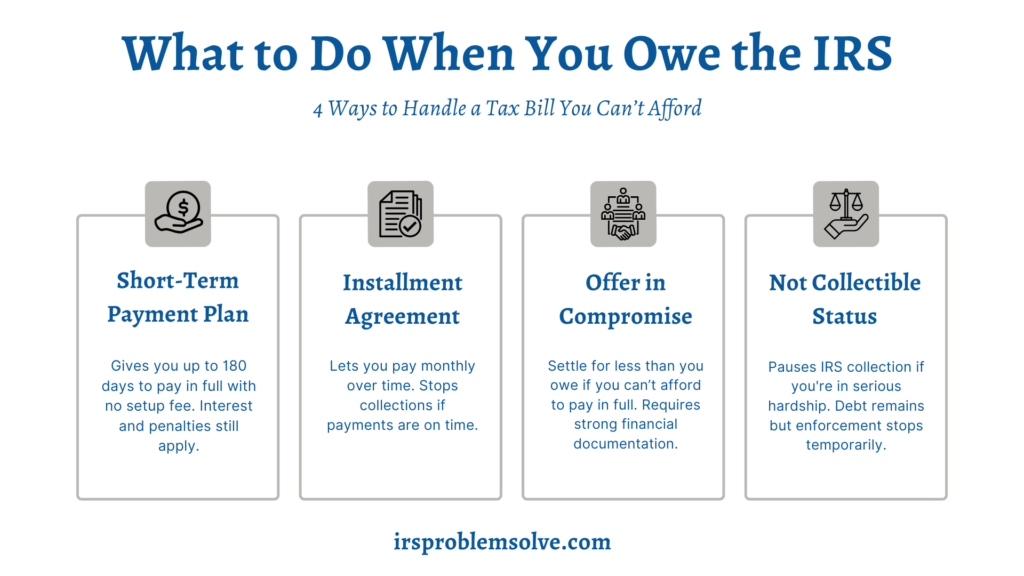
What to Do If You Can’t Pay Your Taxes
If you’re a small business owner staring down a tax bill you can’t afford to pay, take a breath. You’re not the only one. This is far more common than people realize. One survey found that 36% of self-employed individuals admitted to not paying their taxes at all. That doesn’t mean they’re dishonest; it often means they were unprepared, miscalculated their tax burden, or ran into cash flow issues.
The reality is that many small businesses operate on razor-thin margins. A few slow months, unexpected expenses, or major equipment purchases can throw off your entire financial picture. By the time tax season arrives, you might not have the liquidity to pay what you owe. It’s stressful, but it’s also solvable. The key is not to ignore the problem because the IRS doesn’t go away, and inaction will only make things worse.
Why You Should Never Ignore an IRS Tax Bill
The IRS has a structured system for collecting unpaid taxes, and it’s not one you want to be on the receiving end of.
These charges add up quickly. A manageable tax bill today can snowball into a financial crisis in a few months if left unaddressed.
When you don’t pay your tax bill by the due date, a few things happen almost immediately:
- Interest starts accruing daily on the unpaid balance.
- Late payment penalties begin stacking up, usually at 0.5% of your monthly unpaid taxes. Over time, these can reach up to 25% of the original tax bill.
- If you haven’t filed your return, a failure-to-file penalty kicks in, typically 5% per month.
And then there’s enforcement. If you continue to ignore IRS letters and notices:
- The IRS can file a federal tax lien against your property, damaging your credit and making it harder to sell assets.
- They can issue a levy allowing them to seize your bank funds, garnish wages, or intercept payments clients or vendors owe you.
Let’s Talk Solutions: Your IRS Payment Options
If you can’t pay your tax bill in full, you still have several ways to stay in good standing with the IRS. Here are the most common (and realistic) options for small business owners:
1. Short-Term Payment Plan (Up to 180 Days)
If you need a little extra time to pull together funds, a short-term payment plan might be the right fit. The IRS offers a no-hassle way to pay your full balance within 120–180 days. There’s no setup fee, and you can apply online if you owe less than $100,000 in combined tax, penalties, and interest.
Benefits:
- Quick and easy setup
- Keeps you out of collections
- Gives you breathing room without long-term commitment
Drawbacks:
- Interest and penalties still apply
- You must pay the full amount within the time limit
2. Installment Agreement (Long-Term Payment Plan)
If your tax debt is more substantial or you need more time, a long-term installment agreement allows you to pay off your balance in monthly installments. This is one of the most popular options for small business owners with ongoing cash flow.
You’ll need to propose a reasonable monthly payment based on your financial situation. Once approved, as long as you stick to the plan, the IRS will leave you alone with no liens or levies.
Benefits:
- Stops IRS enforcement
- Predictable monthly payments
- Can be tailored to your budget
Drawbacks:
- Interest and penalties still accrue until paid off
- There may be a one-time setup fee
3. Offer in Compromise (Settle for Less Than You Owe)
If your financial situation is dire, you may qualify for an Offer in Compromise (OIC), a program that lets you settle your tax debt for less than you owe. The IRS reviews your income, expenses, assets, and ability to pay, and if they determine you can’t reasonably pay the full amount, they may accept a lower offer.
Benefits:
- Potential for significant reduction in tax debt
- Permanent resolution if accepted
- Fresh start for your business finances
Drawbacks:
- Requires detailed financial documentation
- Application fee ($205 unless waived)
- Can be rejected if not properly prepared
4. Currently Not Collectible (CNC) Status
You might qualify for CNC status if you’re experiencing extreme financial hardship, such as struggling to pay rent or buy groceries. This means the IRS temporarily pauses all collection activity, including liens and levies. They’ll periodically review your finances to see if your situation has improved.
Benefits:
- Immediate relief from collection efforts
- No required payments during the hardship period
Drawbacks:
- Interest and penalties continue to grow
- Doesn’t eliminate the debt, just delays collection
Don’t Let Fear Freeze You
Many small business owners don’t realize that the IRS isn’t trying to ruin their lives. They just want to collect what they’re owed, and the IRS has formal programs designed to make that process manageable, even for struggling taxpayers.
The worst thing you can do is ignore the problem. The second worst thing is trying to go it alone when you’re overwhelmed. Even a simple phone call to the IRS can feel intimidating if you don’t know the right terms or process. That’s where working with a tax attorney makes all the difference.
We’re Here to Help
We’re here to guide you out of the fog if you’ve found yourself behind on taxes, whether it’s a missed deadline, an unpaid bill, or multiple years of unfiled returns. At our firm, we help small business owners navigate the complex world of IRS collections, negotiate payment plans, and file for offers in compromise with confidence.
You don’t have to figure this out by yourself. We’ll review your financial situation, explain your options in plain English, and help you move toward resolution without fear, confusion, or pressure.
Why wait? Contact us for a confidential consultation.




